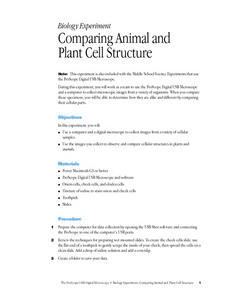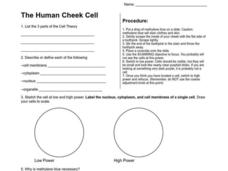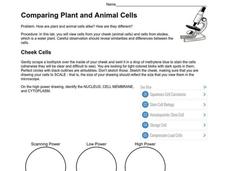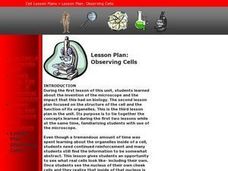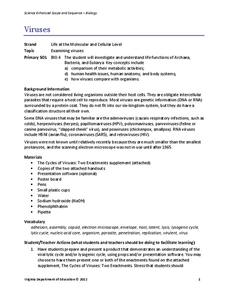Curated OER
Human Cheek Cell
Get up close and personal with human cells with this lab instructional activity. Learners use a microscope to examine their own cheek cells, drawing diagrams of the cells and identifying the parts when they have focused in on a visible...
Curated OER
Comparing Animal and Plant Cell Structure
Students work as a team to use the ProScope Digital USB Microscope and a computer to collect microscopic images from a variety of organisms. When they compare these specimens, they are able to determine how they are alike and different...
Curated OER
The Human Cheek Cell
In this human cells worksheet, 7th graders complete a science experiment using human cheek cells. Students sketch the cells at high and lower power and label the cell nucleus, cytoplasm, and cell membrane.
Curated OER
Comparing Plant and Animal Cells
In this comparing plant and animal cell worksheet, students use a microscope to observe cheek cells and onion cells. They compare their observations and answer 3 questions about their discoveries.
Curated OER
Use of Microscopes and Creation of Slides
Students explore the use of microscopes and the creation of slides. They practice using, adjusting and viewing with a microscope. they view slides of familiar substances such as blood and fibers. In addition, they create slides using...
Curated OER
The Gift of Life - Day 2: "Cell & Organelle Time to Tell" and "World in Color" (Chapters 2-4)
Students complete a cell biology lesson and a color lesson based on The Giver. In this biology and reading comprehension lesson set, students examine cells using microscopes. They look at the organelles and listen to How Much is a...
Curated OER
Cells All Around
Students measure the size of an epithelial cell and to estimate the number of epithelial cells in a given area of the body. After watching a video on cells, student groups perform an experiment using a microscope to view some of their...
Curated OER
What's Outside the Cell Membrane ?
Students examine the cell coats (matrix) of chondrocytes and fibroblasts and observe these cells actively exclude particles which are released around them. They observe the function of the cell membrane as a gatekeeper as it prevents...
Curated OER
Cells: Nature's Building Blocks
What you will find on this page is the general outline of a unit on the use of a microscope and the structure of the cell. There is no actual educational content here, so you will need to design the details of each of the four student...
Curated OER
How Can We Study the Differences in Animal and Plant Cells Using the Compound Microscope?
Students examine their cheek cells with a compound microscope. They identify different parts of the cell. They compare and contrast animal and plant cells with the microscope as well.
Curated OER
Plant and Animal Cells
Young scholars investigate parts of a cell. In this plant cell lesson, students determine the difference between plant and animal cells. Young scholars discover that coral is an animal based on cell characteristics. Students create...
Curated OER
Using Microscopes
Students do an experiment using a microscope. In this lesson plan, about cells, students examine different slides using a microscope. Students look at an onion skin, cheek cells, and potato cells. In each of these, students find cell...
Curated OER
Underneath the Microscope
Eighth graders enhance their skills in operating a microscope. They become comfortable with the vocabulary associated with microscopes and investigate how to place slides and focus them properly using the microscope. Students are given...
Curated OER
What Does Life Look Like Under a Microscope?
Students discover cells make up all living things. In this life science lesson, students investigate living organisms and the cells that create them. Finally the students create a testable question, conduct an investigation, and draw...
Curated OER
Comparing Plant and Animal Cells
In this comparing plant cells and animal cells worksheet, students view cells from their cheeks and cells from elodea. A Venn diagram reveals similarities and differences between the cells.
Curated OER
Seeing Cells
Pupils discuss what comes to mind when they hear the term cell and discuss what a cell is in biological terms. They look at pictures of cells and color a picture of a cell diagram, writing the job of each part as they go. After the...
Curated OER
The Human Cheek Cell
Students list the parts of cell theory and describe and define vocabulary. In this cell lesson students complete a handout that includes sketching a cell.
Curated OER
Cells Are Us
Young scholars explore cells. In this science lesson plan, students investigate how the cell is the basic unit of life, that cells divide slowly to become mass of cells, and that there is a gradual loss of cells throughout life.
Curated OER
You...Instead of the Onion Skin
Young scholars observe their own epithelial cells from the inside linings of their cheeks using DigiScope technology. They prepare a slide with both onion cells and epithelial cells and make an illustrated booklet for a PowerPoint...
Curated OER
Cells, The Structural and Functional Units of Life
Students observe the general structure and organelles of plant and animal cells. Students prepare microscope slides of elodea, onion, check, and cork and identify the cells by size and shape as unicellular, multicellular, plant or animal.
Curated OER
Seeing Cells
Sixth graders study living cells and their functioning units. In this cell lesson students color cell diagrams, answer questions and discuss the differences between plant and animal cells.
Curated OER
Biology: Understanding Cellular Organelles
Students distinguish the differences between Prokaryotic and Eukaryotic cells. Using microscopes, they examine a variety of plant and animal cells. Working in groups, they draw and label plant and animal cells and show the mathematical...
Virginia Department of Education
Viruses
Germs, parasites, and viruses, oh my! Facilitate a lesson on viruses as individuals explore functions of Archaea, Bacteria, and Eukarya. They learn how viruses compare with other organisms in nature and how they contribute to health...



